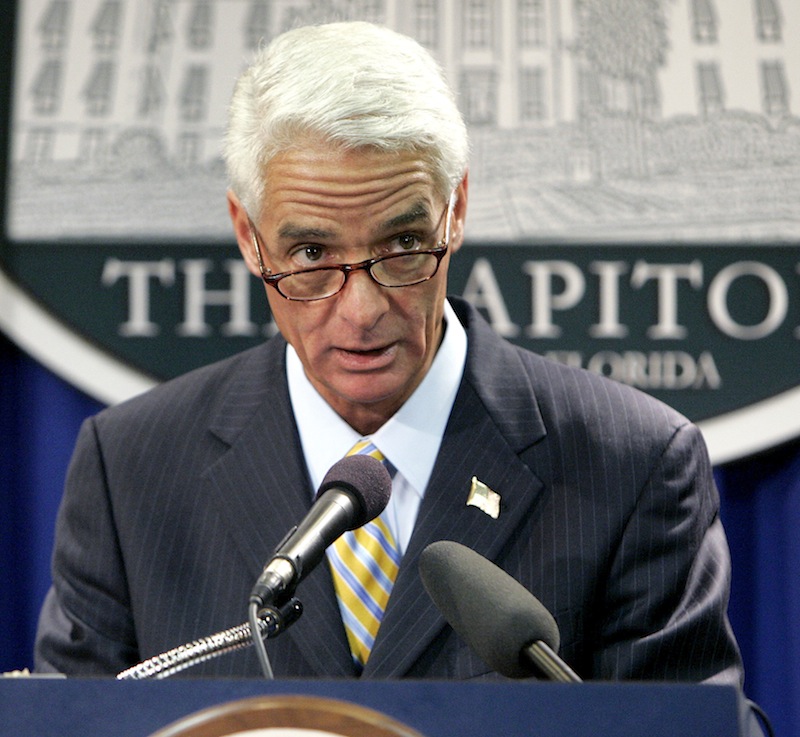Democrats are in danger of losing control of the Senate and taking control of the House seems virtually beyond reach in the 2014 election cycle but gubernatorial races are another story. In those races Democrats look poised to claim a few victories.
Earlier in the week the Democratic-leaning Public Policy Polling survey polled five governor’s races on behalf of MoveOn.org. The pollster found in those five races (Maine, Kansas, Pennsylvania, Georgia, and Florida) Democrats lead the Republican governor. In Arkansas, a new Talk Business-Hendrix College Poll also found Democrat Mike Ross ever so slightly leading Republican Asa Hutchinson in the gubernatorial race, 44 percent to 43 percent.
Currently, Republicans control 29 governor’s mansions while Democrats control 21. Although Democrats seem unlikely to take control the majority of governor’s mansions in the 2014 election cycle, they increasing look likely to make gains in a number of gubernatorial races and move closer to an even split with Republicans.
About a week earlier, Larry Sabato’s Crystal Ball at the University of Virginia’s Center for Politics released a new analysis on the outlook for the 2014 election cycle. For the governor’s races the analysis said to expect a “modest net Democratic gain of one to three governors’ mansions.” Crystal Ball managing editor Kyle Kondik cited Pennsylvania, Maine, and Florida as possible races where a Republican incumbent governor would be replaced with a Democrat.
 Embattled Gov. Tom Corbett (R-PA) delivers his budget address for the 2014-15 fiscal year. (AP Photo/Matt Rourke)
Embattled Gov. Tom Corbett (R-PA) delivers his budget address for the 2014-15 fiscal year. (AP Photo/Matt Rourke)
Kondik told TPM that it’s an even split among the six most competitive races: Pennsylvania, Maine, and Florida all have Republican governors while Arkansas, Illinois, and Connecticut have Democratic ones. But, Kondik added, the “the difference is that the three Republican seats are in more danger than the Democratic ones.”
“It’s like the opposite of the Senate, the Republicans have a lot of places to defend because this set of governors was last contested in 2010,” Kondik said. “Whereas, in the Senate this map was contested in 2008 so the Democrats have a lot to defend.”
In Pennsylvania, Gov. Tom Corbett (R) has suffered from lackluster poll numbers and is seen as a very easy pickup despite a contested Democratic field. In Maine, Democrats feel they have a strong candidate in openly gay Rep. Mike Michaud to defeat Gov. Paul LePage (R) and in Florida, perhaps the most high-profile gubernatorial race of the cycle, incumbent Gov. Rick Scott (R) faces a serious threat from former Gov. Charlie Crist (D).
Kondik cautioned though the optimistic outlooks in those races by no means marks a sweep of governors’ mansions this cycle. Actually, a useful comparison to this year, is 1986 when then-President Ronald Reagan was in his second midterm. In that year Republicans lost the Senate, lost five house seats but actually gained eight governorships.
“If the election sort of plays out the way that we think it will at this point with Republicans gaining Senate seats — maybe or maybe not gaining the Senate — gaining a small number of House seats, but then the Democrats winning some governorships that would be a split decision akin to 1986 that’s the kind of year we don’t necessarily see because a lot of times the governorships will move with the federal partisan wins,” Kondik said.
 President Ronald Reagan gestures addressing supporters during a two hour campaign stop on Feb. 12, 1986 for former Missouri Gov. Christopher Bond. (AP Photo/James A. Finley)
President Ronald Reagan gestures addressing supporters during a two hour campaign stop on Feb. 12, 1986 for former Missouri Gov. Christopher Bond. (AP Photo/James A. Finley)
That’s not to say that Democrats are a sure thing on the other governorships. Sabato’s Crystal Ball rates Illinois, Connecticut, and Arkansas as toss ups. Illinois, in particular, could conceivably fall into Republican hands as Gov. Pat Quinn (D) has suffered from lackluster poll numbers and likely Republican challenger Bruce Rauner is making sure to highlight crossover appeal. Still, observers expect some Democratic pickups.
“Despite Obama’s lackluster approval ratings and the theory that’s been sort of floated out of late that the Democrats can be punished twice for the Affordable Care Act in back-to-back midterms one would still expect that the GOP is going to shed a few seats after making such huge strides in the 2010 tsunami,” the University of Minnesota’s Eric Ostermeier told TPM.
“That cycle they won 23 seats and the Republican party since the turn of the 20th Century, they’ve only won 23 seats in back-to-back midterms once,” Ostermeier said. “That actually happened in 1994 and 1998, so fairly recently but of course — 1994 was a momentous sea change, 2010 was as well. Could it happen again? Historically not likely but you kind of have to like hone in then and look at the map.”
Correction: This piece originally said Arkansas had a Republican governor. We regret the error.






